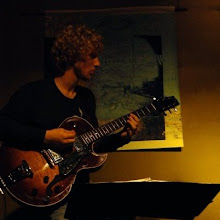
Born in 1946 in Wolverhampton, England, Dave Holland was a steady figure on the London jazz scene when Miles Davis saw him at the fabled Soho jazz club Ronnie Scott’s in1968, playing in a combo that opened for the Bill Evans Trio. “Miles heard something in his sound and his ideas," recalled Jack DeJohnette, who was Evans’s drummer on the date. A month later, Holland was on the bandstand with Davis at Count Basie’s Harlem nightclub. He then joined the rhythm section on Filles de Kilimanjaro, and the revolutionary In a Silent Way and Bitches Brew sessions. It was a heady two years, but Holland was quickly developing his own ideas about music.
Eager to pursue his own radical new sounds, Holland did what many of his peers would not have contemplated. He quit Davis’ band, giving up the arena gigs at vast venues like Madison Square Garden to commit to the creation of his own music. And then he got even busier. The 1970s found Holland prolific. Solo, and in collaboration, he became a dominant voice in the new music. Along with fellow Miles alum Chick Corea, he formed the shortlived supergroup Circle, and then joined Rivers for the epochal Conference of the Birds. The 1972 album, one of Holland’s first for the ECM label, was a quartet session that also featured multi-reedist Anthony Braxton and drummer Barry Altschul (both of Circle). Inspired by the birds that frequented the yard of Holland’s London home, and a 12th century Persian epic written by Farid ud-Din Attar, the album became a classic: outward-thinking music that made the avant-garde swinging and coherent, suffused in feeling yet attentive to form. Holland also explored the essence of his instrument in the duo record with Barre Phillips, Music for Two Basses (1971) and the remarkable solo album Emerald Tears (1977).
It was Holland’s strengths as a collaborator that marked many of his most notable efforts of the decade. His ongoing association with Sam Rivers, Anthony Braxton and trumpeter Kenny Wheeler saw Holland’s presence on a slew of important sessions, including a pair of improvisatory duets with Rivers and multiple credits on Braxton’s Arista recordings, such as the splendid New York (Fall 1974). Joining forces with DeJohnette again and guitarist John Abercrombie, Holland joined the collective Gateway trio from 1975-77 recording a pair of albums for ECM. (The trio recorded twice again in the 1990s and continues to play the occasional concert).
Ever versatile, Holland also recorded with folk and rock musicians. As the only acoustic bassist living in Woodstock, NY, at the time, the Englishman was in demand. Michael Cuscuna, who produced several Braxton sessions with Holland on board, solicted his talents for Bonnie Raitt’s Give It Up. Holland also got in the studio with bluegrass legend Vassar Clements and John Hartford. (It was in the same spirit that Holland found himself jamming with Jimi Hendrix one fleeting night in 1969 with drummer Buddy Miles).
Holland formed his first working quintet in 1983, featuring alto saxophonist Steve Coleman, trumpeter Wheeler and trombonist Julian Priester. A series of albums recorded over the next four years – including Jumpin’ In, Seeds of Time, and Razor’s Edge – laid the foundation for Holland’s songbook.
Subsequently, he formed the Dave Holland Trio (with Coleman and DeJohnette) for the 1988 album Triplicate, and teamed with Coleman, electric guitarist Kevin Eubanks and drummer Marvin “Smitty” Smith for Extensions in 1989.
The bassist also continued to enjoy strong collaborations with a vast range of his peers, often connecting with celebrated figures from the previous generation of jazz icons. The following year, Holland got together in a unique trio of jazz legends, drummer Billy Higgins and pianist Hank Jones to record The Oracle – a genuine power summit. Other stellar projects included Question & Answer with Pat Metheny & Roy Haynes as well as Like Minds with Gary Burton. This has been a consistent pattern in Holland’s career. During the ‘90s, he renewed an affiliation, begun in the 1970s, with Joe Henderson, joining the tenor saxophonist on So Near (So Far), Porgy & Bess, and the Joe Henderson Big Band. Likewise, Holland reunited with vocalist Betty Carter, touring and recording the live album Feed the Fire. Fellow Davis album Herbie Hancock invited Holland to tour with him in 1992, subsequently recording The New Standard, Holland joined Hancock’s band again in 1996 and, more recently, was part of the sessions for River: The Joni Letters, winner of the 2008 Grammy for Album of the Year.
Holland also formed his current quintet, which includes tenor saxophonist Chris Potter, trombonist Robin Eubanks and, a more recent addition, drummer Nate Smith. Among their notable recordings are Not for Nothin, Prime Directive and Extended Play.
In 2005, Holland formed Dare2 Records, after a 34-year relationship with ECM Records, the label where he became a signature artist. Originally, Holland created Dare2 Records as an imprint “to have more control over the entire process of releasing an album,” he says. “But in the long term, there’s a lot of promise in making music this way, especially with the changing environment in the recording industry.” Sharing the bandstand with the best of a younger generation of players in his fan-favorite quintet, he now has three albums out on Dare2: the Grammy-award winning Overtime (2005), Critical Mass (2006) and Pass It On (2008). The debut recording from the Dave Holland Octet, entitled Pathways, will be released in the fall of 2009 on Dare2 also. As he has in his music, Holland has embraced change and new ideas in business like few of his generation or younger.
Here is a clip of Dave Holland playing at the Montreal Jazz Festival with his quintet, including our interviewee from two weeks ago, Chris Potter.


No comments:
Post a Comment